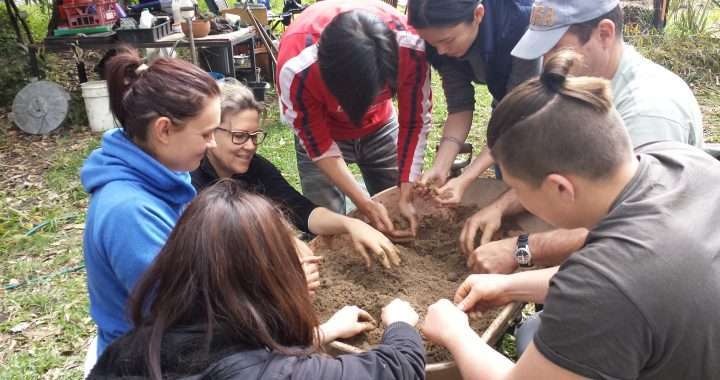
Farm individuality – new concepts of individuality for urban food growers
Author : My Food Garden
Farm individuality is an important principle in biodynamic food growing. Individuality can also be applied in urban food growing spaces of any scale, but there are some changes needed in how to work with individuality, some new perspectives.
I had the pleasure of running a workshop recently at the global centre for biodynamics in Dornach Switzerland at the Goetheanum. It was the 2018 international biodynamic conference. The workshop I ran was focused on working with biodynamic preparations in the urban food growing context. Farm individuality was discussed and a number of the perspectives described below evolved from our conversations.
Background of farm individuality
Rudolf Steiner, the founder of biodynamic agriculture, first raised the term “farm individuality” in his Agriculture lectures in 1924. He discussed the “farm organism”, expressing how: mineral, plant, animals, human beings, land history, climate and connection to cosmic cycles are all part of a system. If brought together in a dynamic way, they interact positively to express the farm’s unique potential or “farm individuality.”
Biodynamic farmers work towards balancing the soil and creating a farm individuality that is a self-sustaining whole, where fertility and feed come from within the farm rather than from outside. This closed loop system incorporates an ideal balance of animals and plant life, creating environmental and economic benefits.
For chemical farmers, its obvious they do not have a closed loop system. For organic farmers, seeking high levels of productivity, having the right balance of animals to recycle organic matter into crops is often challenging. For biodynamic farmers, the biodynamic preparations are a potent help, but challenges remain. Farm individuality is a concept designed for farmers to strive towards.
Benefits of using farm individuality
- Sustainable soil improvement
- Improved plant and animal vitality
- Reduced impact from crop pests and diseases
- Reduced costs of operation due to less external resources being used
- Higher quality crops and more consistent yield
Farm or garden individuality for urban food growers – new perspectives
For urban farmers and gardeners, the challenge with inputs and resources on site is amplified, especially with animals and their manure being recycled into the soil. What are the new perspectives?
- Farm/garden location – The boundary of the farm or garden organism is extended to include the neighbourhood or city, for example (1) Green waste sourced from the neighbourhood to make compost, (2) Using raw materials from a city to be transformed to living matter, for example, coffee grounds from a large number of cafe’s in a city used to make mushrooms.
- External local inputs -Transform external inputs with biodynamic compost preparations, for example use clean local green and dry matter
- Internal inputs – Use as a resource for food growing and enhance with biodynamic preparations, for example, weeds from the garden turned into a liquid fertiliser
- Seeds – Save seeds of plants grown on site as they are progressively adapting to the local climate, soil and garden management practices. Robustness of crops improves over time with saved non-hybrid seeds
- Water – Use water collected on site as much as possible and design growing spaces to maximise benefit from water usage, thus soil humus becomes a place to store water. Filter town water or recycled water if no water is collected on site
- Animals – Use smaller animals such as chickens (but keep them out of the food garden), create habitats for native beneficial insects and environments where native animals are welcome and become part of the life balance.
- Cultural development – Connect your growing areas to local people and to the history of the local area. Use spaces to celebrate the food grown and build a local food culture
- Observation – Develop exquisite observation skills in your food growing space. Its called Goethean observation
- Consciousness – It is vital the gardener develops strong concentration and intention when using the biodynamic preparations, aimed at being mentally present during food growing activities.
The last point above is the most important one. Attitude is everything in life. What is more personal, more reflective of your individual character than how you are when you work in the garden?
Come along to one of our Workshops or talk to us about our Coaching service. I suspect that you will feel what farm individuality means from an urban perspective when you experience our gardens!
Happy Gardening
Authored by Peter Kearney – My Food Garden.

